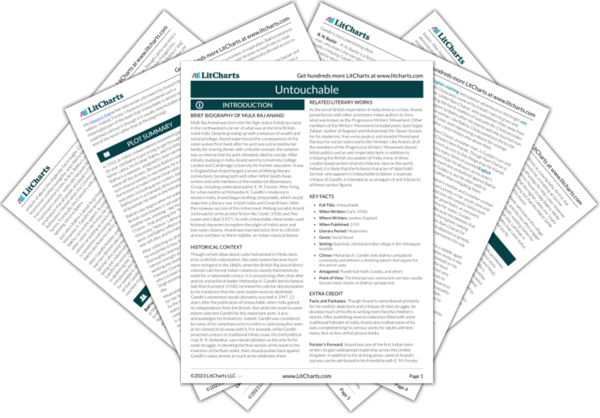Caste Quotes in Untouchable
[Bakha] had wept and cried to be allowed to go to school. But then his father had told him that schools were meant for the babus, not for the lowly sweepers. He hadn’t quite understood the reason for that then. Later at the British barracks he realized why his father had not sent him to school. He was a sweeper’s son and could never be a babu. Later still he realized that there was no school which would admit him because the parents of the other children would not allow their sons to be contaminated by the touch of the low-caste man’s sons. How absurd, he thought, that was, since most of the Hindu children touched him willingly at hockey and wouldn’t mind having him at school with them. […] These old Hindus were cruel. He was a sweeper, he knew, but he could not consciously accept that fact.
A superb specimen of humanity [Bakha] seemed whenever he made the high resolve to say something, to go and do something, his fine form rising like a tiger at bay. And yet […] he could not overstep the barriers which the conventions of his superiors had built up to protect their weakness against him. He could not invade the magic circle which protects a priest from attack by anybody, especially by a low-caste man. So, in the highest moment of his strength, the slave in him asserted himself, and he lapsed back, wild with torture, biting his lips, ruminating his grievances […].
He contemplated his experience now in the spirit of resignation which he had inherited through the long centuries down through his countless outcaste ancestors, fixed, yet flowing like a wave, confirmed at the beginning of each generation by the discipline of the caste ideal.
What had [Bakha] done to deserve such treatment? He loved the child. He had been very sorry when Chota refused to let him join the game. Then why should the boy's mother abuse him when he had tried to be kind? […] ‘Of course, I polluted the child. I couldn't help doing so. I knew my touch would pollute. But it was impossible not to pick him up. He was dazed, the poor little thing. And she abused me. I only get abuse and derision wherever I go. Pollution, pollution, I do nothing else but pollute people. They all say that: “Polluted, polluted!” She was perhaps justified though. Her son was injured. She could have said anything. It was my fault and of the other boys too. Why did we start that quarrel? It started on account of the goal I scored. Cursed me! The poor child!’
He wanted to be detached. It wasn’t that he had lost grip of the emotion that had brought him swirling on the tide of the rushing stream of people. But he became aware of the fact of being a sweeper by the contrast which his dirty khaki uniform presented to the white garments of most of the crowd. There was an insuperable barrier between himself and the crowd, the barrier of caste. He was part of a consciousness which he could share and yet not understand. He had been lifted from the gutter, through the barriers of space, to partake of a life which was his, and yet not his. He was in the midst of a humanity which included him in its folds and yet debarred him from entering into a sentient, living, quivering contact with it.












